As a blogger, you know the importance of creating content that attracts readers and keeps them coming back for more. But if you’re like most people, you don’t have the time or energy to organize your blog posts into something anyone else would want to read.
The good news is that there’s an easy solution to this problem: Seo software.
If you’re unfamiliar with the term, Seo refers to search engine optimization—a strategy that helps web pages rank higher in search results on Google, Bing, and other sites. In other words, it’s an easy way to make sure your blog is visible and accessible to people who are interested in what you have to say.
Seo tools automate much of the process of optimizing your content. They’ll help you create headlines and descriptions that will draw the right people in, assign keywords that ensure your posts show up when someone searches for those terms, and track how well your content performs—so you can make adjustments as needed.
Before long, people will hear about your blog from friends and family or through social media—and they’ll come looking for it on their own.
Best Seo Software List

1. Ahrefs: SEO Keyword Tool

Ahrefs is one of the most recommended SEO tools online. It’s only second to Google when it comes to being the largest website crawlers. SEO experts can’t get enough of Ahrefs’ Site Audit feature as it’s the best SEO analysis tool around. The tool highlights what parts of your website need improvements to rank better in search engines. From a competitor analysis perspective, you’ll likely use Ahrefs to determine your competitor’s backlinks to use them as a starting point for your own brand. You can also use this SEO tool to find the most linked to content within your niche, check and fix broken links on your website,and get an overview of your best-performing pages (so you can see what information is drawing in the visitors).
2. Google Search Console: Top SEO Tool
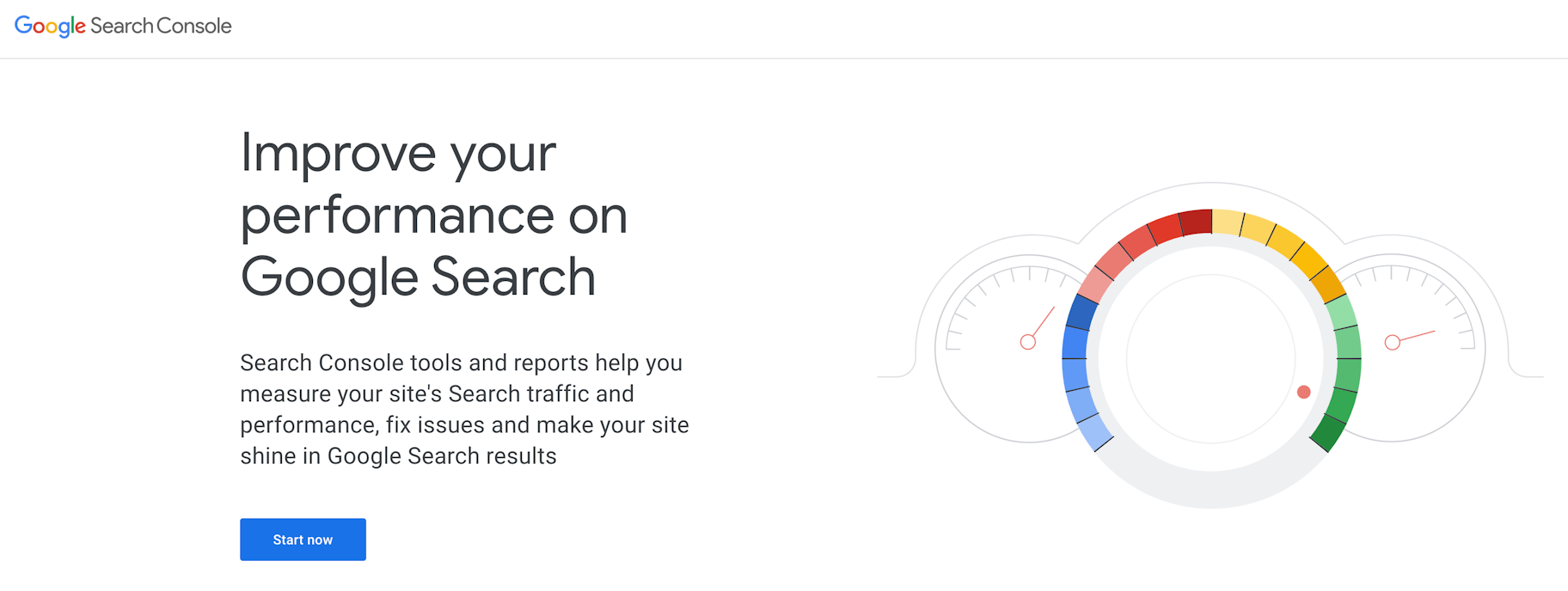
Offered for free to everyone with a website, Google Search Console lets you monitor and report on your website’s presence in Google SERP. All you need to do is verify your website by adding a code to your website or going through Google Analytics and you can submit your sitemap for indexing. Although you don’t need a Search Console account to appear in Google’s search results, you can control what gets indexed and how your website is represented with this account. As an SEO checker tool, Search Console can help you understand how Google and its users view your website and allow you to optimize for better performance in Google search results. It’s especially useful for new websites as it lets site owners submit web pages for search indexing.
3. SEMRush: Marketing SEO Tools
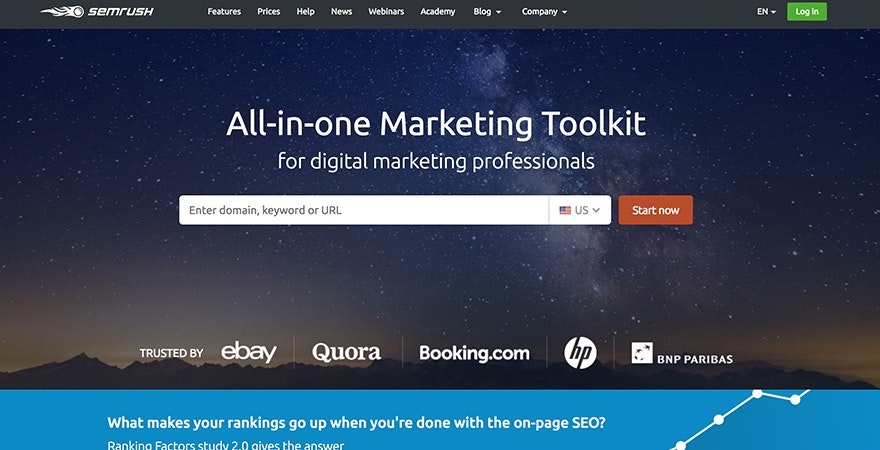
Marketing SEO tools like SEMRush tend to be fan favorites in the SEO community. Experts love that they let you easily assess your rankings as well as identify changes and new ranking opportunities. One of the most popular features of this SEO tool is the Domain Vs Domain analysis, which allows you to easily compare your website to your competitors. If you’re looking for analytics reports to help you better understand your website’s search data, traffic, or even your competitors, you’ll be able to compare keywords and domains. The On-Page SEO Checker tool allows you to easily monitor your rankings and find some recommendations on how to improve your website’s performance.
4. KWFinder: SEO Keyword Tool
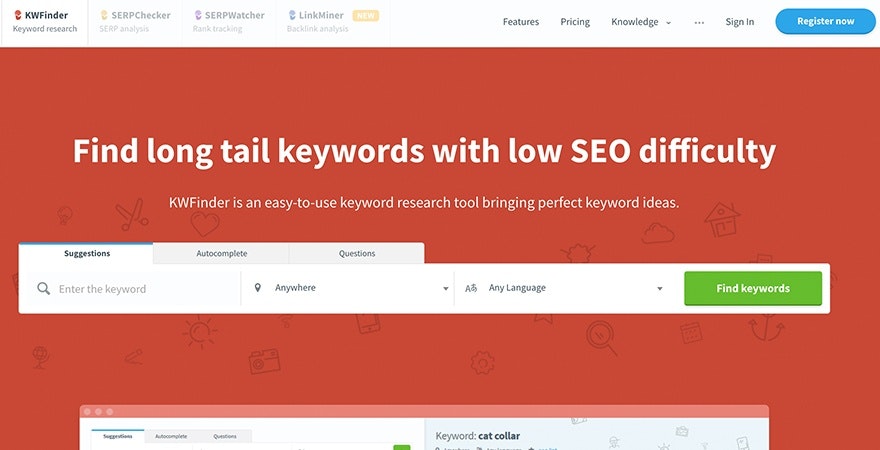
An SEO keyword tool like KWFinder helps you find long-tail keywords that have a lower level of competition. The experts use this SEO tool to find the best keywords and run analysis reports on backlinks and SERP (Search Engine Results Page). Their Rank Tracker tool helps you easily determine your ranking while tracking your improvement based on one key metric. Plus, if that’s not enough, you’ll get a ton of new keyword ideas to help you rank your website even higher.
5. Moz Pro: SEO Software
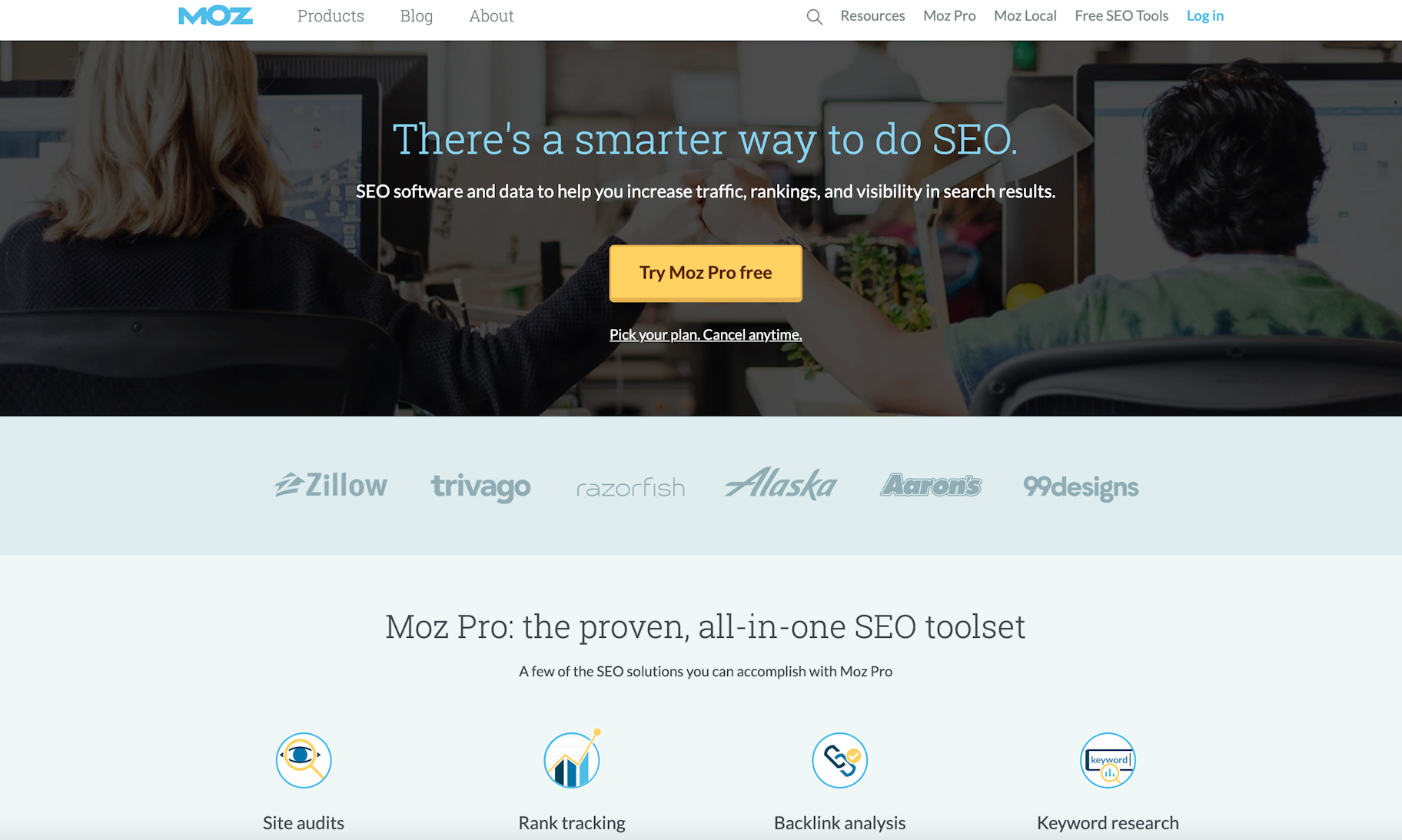
SEO software Moz Pro keeps popping up as one of the best SEO tools that experts actually use. Some specialists raved about how Moz was always up to date despite Google’s regular algorithm changes. Others praised Moz’s chat portal that allows them always to get an insightful response to every question asked. Whether you’re looking for keyword recommendations or a site crawl, Moz is a full-service powerhouse. You can get great insights into how your website is performing but also how to improve it. They also have a free MozBar toolbar that you can download to see your website’s metrics while browsing any page. If you’re looking to learn more about SEO, you should also consider checking out MozCon, their annual conference.
6. Ubersuggest: Keyword Tracking Tool
Ubersuggest, developed by Neil Patel, is a free keyword finder tool that helps you identify keywords and also the search intent behind them by showing the top ranking SERPsFrom short to long-tail phrases, you can find the right terms to use on your website with hundreds of suggestions from this free great keyword tool. Metrics Ubersuggest includes in its reports are keyword volume, competition, CPC, and seasonal trends. Great for both organic SEO and paid PPC, this tool can help you determine if a keyword is worth targeting and how competitive it is.
7. Answer The Public: Free SEO Tools

Free SEO tools like Answer The Public allow you to easily find topics to write about for your blog. I’ve used this tool in the past to create content around specific keywords to better rank online. Say you’re in the ‘fitness’ niche. You can use this free SEO tool to create content around keywords like fitness, yoga, running, Crossfit, exercise and cover the entire spectrum. It’s great for finding featured snippet opportunities. Say you hire a freelancer to create content for you, all you need to do is download this list and send it over to them. And it would only take you five minutes, making it one of the most efficient ways to come up with SEO topics for new websites.
8. SpyFu: Free SEO Tools

While SpyFu has an amazing premium version, many of our experts raved about its free features. If you’re just starting out, you can easily grow into the paid features as you start succeeding. You can easily view the number of times a keyword gets searched each month while easily determining the ranking difficulty for that keyword. You can also do some research on your competitors to determine which keywords they use. Additionally, you can search your competitor’s, or your own, website to easily see how many organic keywords they have, how many monthly clicks they get, who their paid and organic competitors are, the campaigns they’re running with Google Ads, and more. It’s one of the most detailed SEO analysis tools on the market.
9. Woorank: SEO Ranking Tool
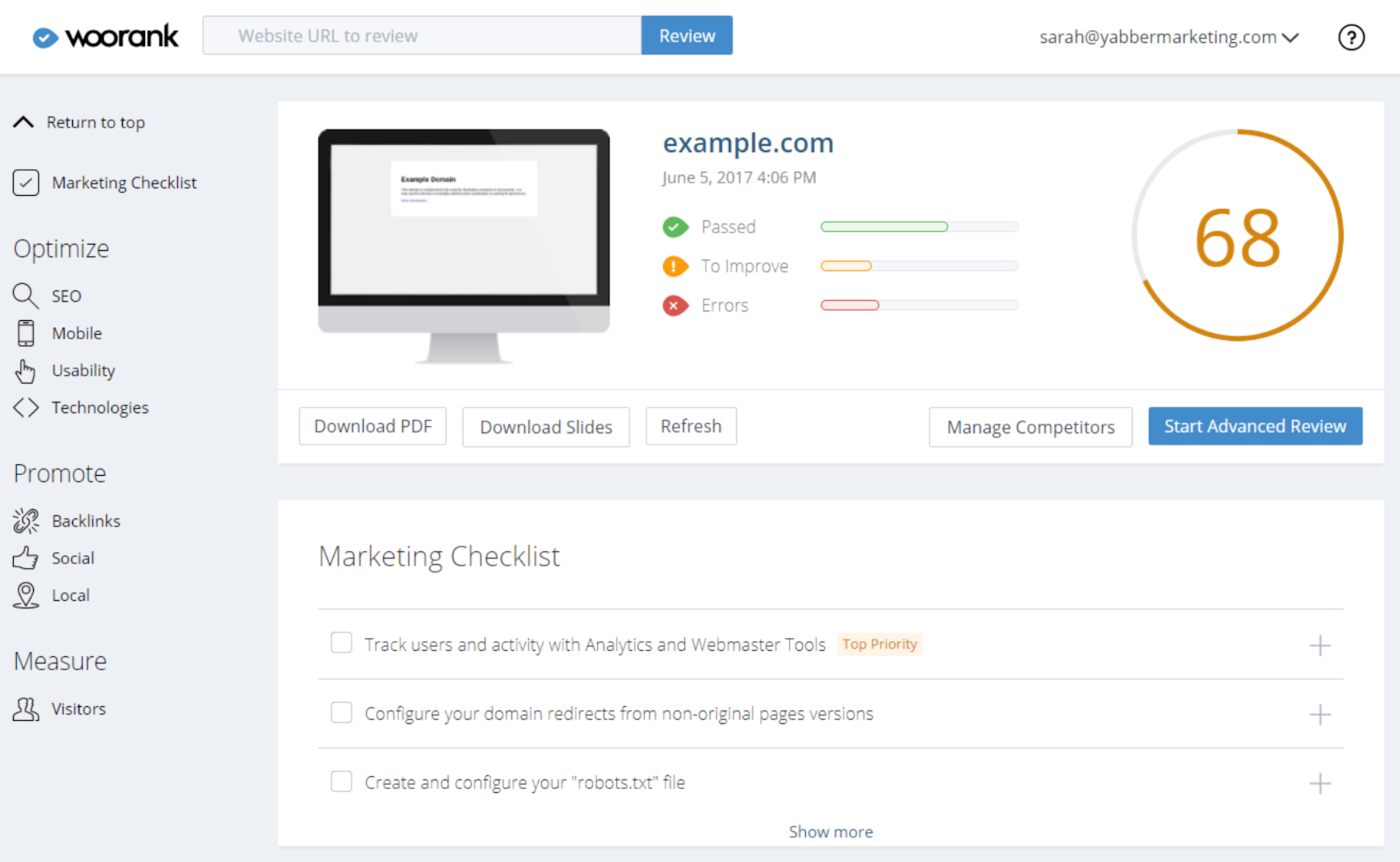
As a top SEO analysis tool, Woorank offers free and paid options to track and report your marketing data. You can plug in your competitors to discover which keywords they are targeting so you can overlap with theirs. Try understanding how keywords perform over time to optimize for users and search engines in the best way possible. And most importantly, understand the things your website is lacking from both a technical and content perspective. Woorank can help you identify duplicate content, downtime, and security issues and provide guidelines on how to fix them.
10. Majestic: Marketing SEO Tools

Majestic is one of the best marketing SEO tools according to experts. It has countless useful features like The Majestic Million which lets you see the ranking of the top million websites. Did your website make the cut? The Site Explorer feature allows you to easily see a general overview of your site and the number of backlinks you have. It also works as an SEO keyword tool to find the best keywords to target while also having features geared to site comparisons and tracking your rank.
best seo tools for beginners
TOP 7 MUST-HAVE FREE SEO TOOLS FOR BEGINNERS
SEO

You can never see too many lists of free tools if you’re just starting out in SEO. Tools are crucial to practicing SEO and grasping a better understanding of how the industry works, but many of them are very expensive. As a beginner, it is not necessary to start by buying a tool that costs a lot of money. Once you know what you’re looking for and know what you’re doing, then you can move on to something advanced. For now, the free SEO tools out there will absolutely get the job done. In fact, many are surprised at just how many quality tools SEO professionals give out for free. Below are some of the top choices for beginners:
- Google Analytics. A great tool to get you started. Even the most advanced professional who make SEO a full-time job are using Google Analytics. It might be confusing at first, but it will help any beginner get a sense of what is measured (website traffic, conversions, audience, etc.) and therefore what is important.
- AdWords Keyword Tool. Completing keyword research is an incredibly important aspect of SEO (you have to know what and where to optimize, after all). This tool will show you the competition, global monthly searches, and local monthly searches for every keyword you try. Even the most advanced SEO professionals turn to this tool for their research.
- Open Site Explorer. This tool will help you find link opportunities through competitor backlink research. The tool comes from SEOmoz and helps you determine if you can earn the same links that your competitors have earned (not to mention do a little bit of snooping).
- SEO by Yoast. This is my favorite SEO plugin to install on a website. It helps walk you through the different steps of SEO to make sure that you’re optimizing each and every webpage. This works best when you’re focusing on optimizing the content on your website.
- PageRank Status. You can download a free browser extension to help you see the PageRank of every webpage you visit. This will help beginners get a sense of where the website ranks on Google (it doesn’t always mean that one website is better quality than another, but it does mean it is more established). This is a great way to find authoritative link building opportunities. You can see SEO stats, site info, page info and page speed all by just clicking on the plugin.
- Google Webmaster Tools. Every SEO professional has a Google Webmaster Tools account, so the sooner beginners get on board, the better. The tool allows you to monitor the indexing of your website, keyword clicks, sitemaps, and lists of links (external as well as internal) to you site.
- Bing Webmaster Tools. You can’t forget that Bing is still the number three search engine out there, so optimizing for it is important even if you’re a beginner. Bing has a few different features than Google Webmaster Tools, but for the most part it serves the same purpose—giving you insight as to the number of clicks, links, indexing, etc.
Conclusion
Let us know your thoughts in the comment section below.
Check out other publications to gain access to more digital resources if you are just starting out with Flux Resource.
Also contact us today to optimize your business(s)/Brand(s) for Search Engines
